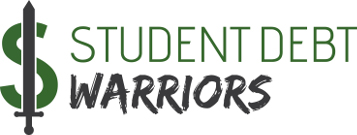COVID-19, the novel Coronavirus sweeping the globe, has forced governments around the world to embrace the concept of social distancing, wherein members of society minimize their contact with others in an attempt to slow and prevent the spread of the disease. While this is the single best measure of flattening the curve of infection so that our medical system can effectively care for the infected, it has had an unfortunate side effect: Mass layoffs and job loss.
While many companies and businesses have made the switch to remote or virtual work, many other businesses can’t operate remotely. This is especially true of the service industry, which includes everyone from restaurant workers to hairstylists to retail workers and more. Those businesses, forced to close their doors, have had to lay off their workers.
Need help keeping track of your student loans? Download our free Student Loan Spreadsheet!
The result is that in the week ending March 21, 2020, nearly 3.3 million workers lost their jobs and filed for unemployment.
In response to this, Congress has passed a $2 trillion stimulus bill designed to prop up the economy while the Coronavirus pandemic is brought under control. Of the many provisions in the bill, called the CARES Act, there are a few important benefits for borrowers of federal student loans.
The CARES Act and Student Loans
In addition to the benefits that the CARES act offers to businesses and individuals, it offers a few very important benefits to borrowers of federal student loans. These include:
1. Federal student loan payments are not due until September 30, 2020.
The CARES Act suspends any payments that are due on federal student loans owned by the Department of Education. This means that if are a borrower in repayment, you don’t need to make your regularly scheduled monthly payments until September 30, 2020.
Loans covered: Stafford Loans, Direct Loans, FFELP Loans held by the Department of Education
Loans not covered: Perkins Loans, FFELP Loans held by a bank or other institution, Private Student Loans
Because the law was just passed, it is difficult to know when the provision stopping payments will go into effect. If you would like to take advantage of this provision, you should contact your student loan servicer to request that your payments be suspended; otherwise, it’s possible that automatic payments may still be withdrawn.
2. Interest on federal student loan payments is waived until September 30,2020.
While payments are suspended, interest is waived. This means that from now until September 30, 2020, interest will not accrue on any of the student loans covered by the law.
Loans covered: Stafford Loans, Direct Loans, FFELP Loans held by the Department of Education
Loans not covered: Perkins Loans, FFELP Loans held by a bank or other institution, Private Student Loans
3. The suspension period does count towards student loan rehabilitation and forgiveness.
If you are working towards student loan forgiveness or rehabilitation, you may be wondering if payment suspension will set your schedule back. The good news is that it will not: For each month that loan repayment is suspended under the act will be treated as though a borrower made their regularly scheduled repayment.
Loans covered: Stafford Loans, Direct Loans, FFELP Loans held by the Department of Education
Loans not covered: Perkins Loans, FFELP Loans held by a bank or other institution, Private Student Loans
This means that if you are currently working towards student loan forgiveness or rehabilitation, the next six months will still count—even if you don’t make payments.
4. Collection of defaulted federal student loans is suspended.
If you have defaulted federal student loans in collection, you can also expect some relief: The CARES Act suspends involuntary collection on Direct Loans and FFELP Loans owned by the Department of Education. Specifically, this includes wage garnishment as well as the garnishment of federal tax refund and federal benefits such as Social Security.
Loans covered: Stafford Loans, Direct Loans, FFELP Loans held by the Department of Education
Loans not covered: Perkins Loans, FFELP Loans held by a bank or other institution, Private Student Loans
5. Loans are cancelled for students forced to withdraw from college due to the pandemic.
If you were forced to withdraw from college due to the Coronavirus pandemic, the CARES Act requires that the Secretary of Education cancel any Direct Loan associated with the semester in which you withdrew. This means that if you took out a Direct student loan for the Spring semester of 2020 and needed to withdraw from school, this loan will be cancelled.
Loans covered: Stafford Loans, Direct Loans
Loans not covered: Perkins Loans, FFELP Loans, Private Student Loans
Does the CARES Act cover private student loans?
Unfortunately, the CARES Act does not cover private student loans. If you have borrowed private student loans, you are still required to make your regularly scheduled monthly payments. Failure to make these payments may result in your private loans going into default and collection.
That being said, if you don’t think that you’ll be able to make your private student loan payments, you should contact your lender. Even private lenders may be willing to temporarily halt your payments or reduce your required payments in order to help you get through the crisis. The worst thing you can do is not call.
The Bottom Line
If you are one of the unfortunate people who has lost their job due to the COVID-19 pandemic, the CARES Act offers substantial relief that you can use to get through the next few months until the economy (hopefully) restarts and things get back to normal.
If you do still have your job, you may be wondering if you should stop making payments since they are not required. While that can be a good way to bolster your savings, continuing to make payments now, while interest is waived, can be an excellent means of paying your loans down faster.
Whether you decide to stop making payments or continue making payments as usual, this pandemic highlights the importance of making sure that you’re keeping track of your student loans. Download our free spreadsheet (below) so that you don’t lose track of your student loan repayment!






